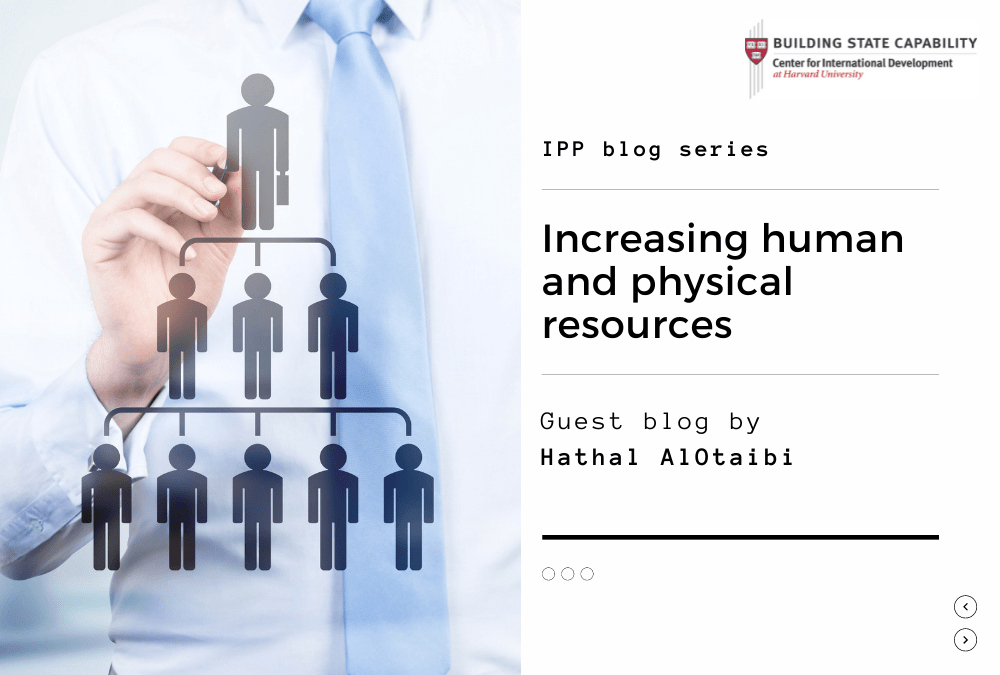Guest blog by Hathal AlOtaibi
Expectations
To be honest, my expectations were met and might have even been exceeded as this course helped me think in a strategic way about the challenge I face as a public servant. While the analysis part is not deeply embedded in the scope of this course, the implementation side was well covered and I really could not ask for more.
Lessons learned
To me the number one lesson learned is the PDIA approach itself. For someone who worked for the government for more than 12 years, I am used to implementing projects in very systematic ways where change to scope or plan is next to prohibited. Usually things we learn during execution, we keep until the end and then document them as lessons learned. Unfortunately that gained knowledge is not used to better align the outcome of the implementation. PDIA helps put the focus on the original challenge rather than the metrics of some project that may or may not help address the challenge based on how complex it is.
Delegation comes next; this course was a revelation when it comes to the importance of delegation and how to do it properly. I do not classify myself as a traditional government leader, yet based on what I have learned in the class I felt strongly that I need to delegate more and allow my subordinates to think and act on their own while keeping in mind that they are accountable for what they do.
Implementation challenge I am working on
I am working on putting together a governance model that establishes roles and responsibilities for me and the team I manage in eastern province. We usually are not empowered to do anything and rely heavily on the headquarter to do the jobs, and over the years this regional branch turned into something like a post office. The reason is that HQ is holding to their own authorities and feel that if they give authority to us, they will be less important or that is at least the way I see it. This was going on for long time, becoming the standard practice, and nobody could challenge status quo despite its negative impact on our public image and the business as well.
Progress made
I identified some entry points in the beginning as per the below fishbone diagram and acted quickly on one of them which is creating an SLA between us and the headquarter to establish a governance of our relationship and the role of each party and the quality expected.

The relevant departments changed their opinion once they saw the SLA coming. Even though the SLA idea did not go through, it helped put us on the right track and convince the relevant departments to delegate some responsibilities to us, which we could do on the spot from the regional office. Identifying entry points got the work started, and the ability to change direction as we proceed allowed us the flexibility and the speed we needed to tackle a complex challenge. At this stage, we are working on the identification of the things that can be done from the regional office and things that require support from the headquarter, which is a great step forward.
New perspectives motivated by PDIA
As I mentioned previously in the lessons learned section, one thing that PDIA changed when it comes to how we handle policy implementation challenges is the learning while doing. We usually spend too much time on planning without really testing our plans. PDIA helped us try things rapidly and find out about unknowns quicker than ever before. This helped us learn what works and what does not, faster than ever before, and to me that was the main takeaway from this course.
Usage of PDIA In The Future
PDIA changed the way I handled things, made me think in a more agile way, and taught me to never overlook the value of learning while doing. It is a powerful tool to test things on the spot and change the route accordingly. I also realized the importance of delegation in this class, because it was clear that having a team of starters is better than followers waiting for directions.
Thanks for putting together this wonderful class.
This is a blog series written by the alumni of the Implementing Public Policy Executive Education Program at the Harvard Kennedy School. Participants successfully completed this 6-month online learning course in December 2020. These are their learning journey stories.
